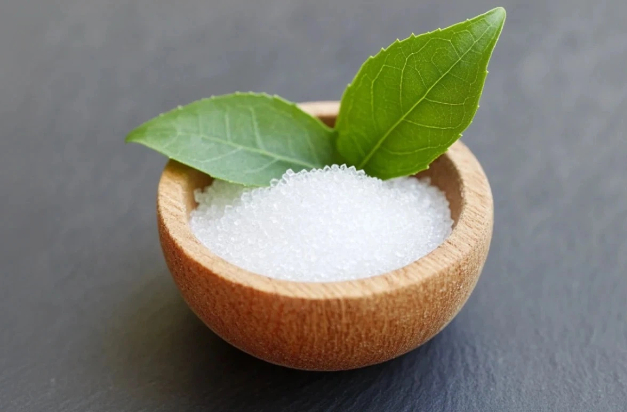Views: 222 Author: Sara Publish Time: 2025-09-28 Origin: Site








Content Menu
● Calorie and Glycemic Index Comparison
● Impact on Blood Sugar and Diabetes Management
● Weight Management and Appetite Control
● Cardiovascular Health Benefits
● Anti-Inflammatory, Antioxidant, and Antimicrobial Effects
● Taste and Culinary Uses of Stevia
● Environmental and Sustainable Benefits
● FAQ
>> 1. What makes Stevia healthier than sugar?
>> 2. Is Stevia safe for people with diabetes?
>> 3. Can Stevia help with weight loss?
>> 4. Does Stevia have any side effects?
>> 5. How does Stevia affect heart health?
In today's health-conscious world, the search for natural alternatives to sugar has led many to discover the benefits of Stevia. Derived from the leaves of the Stevia rebaudiana plant native to South America, Stevia is a natural, zero-calorie sweetener renowned for its intense sweetness and potential health benefits. This article explores why Stevia is widely considered healthier than traditional sugar, supported by extensive scientific research and practical health considerations.

Stevia is a natural sweetener extracted from the Stevia rebaudiana plant. It contains compounds called steviol glycosides, which are responsible for its intense sweetness—about 200 to 400 times sweeter than table sugar. Unlike sugar, which contains calories and carbohydrates, Stevia has virtually no calories or carbs, making it ideal for people seeking to reduce energy intake or manage blood sugar levels.
One of the primary reasons Stevia is considered healthier than sugar is its zero-calorie nature. While a teaspoon of sugar contains approximately 15 calories, Stevia adds none, thus significantly reducing daily calorie consumption—a crucial factor in weight management. Moreover, Stevia has a glycemic index (GI) of zero, meaning it does not cause blood sugar spikes. In contrast, sugar has a GI near 65, which can contribute to insulin resistance and metabolic issues when consumed excessively.
Stevia's unique advantage is its minimal impact on blood glucose levels, marking it as a safe choice for people with diabetes. Scientific studies have demonstrated that stevia does not raise blood sugar or insulin levels and may even improve insulin sensitivity. Research on diabetic animals and humans has shown significant reductions in blood glucose and glucagon responses after consuming stevia, supporting its use in blood sugar management. Stevia's effect on pancreatic β-cells enhances insulin secretion in response to glucose, promoting better glucose control without the risk of hypoglycemia common with some diabetes treatments.
Due to its lack of calories, Stevia can be an effective aid in weight control. Consuming stevia instead of sugar reduces overall calorie intake, curbing excessive energy consumption linked to obesity. Some studies suggest that stevia may suppress appetite or cravings, although more research is needed to confirm this. Unlike sugar, which provides empty calories and can increase hunger and fat storage, Stevia helps support a balanced diet without sacrificing sweetness.
Emerging research suggests Stevia may have positive effects on heart health. Certain compounds in Stevia are associated with lowering harmful LDL cholesterol and triglycerides while increasing beneficial HDL cholesterol. Additionally, Stevia glycosides can dilate blood vessels, which could help regulate blood pressure. Although some studies report potential blood pressure-lowering effects, others show neutral outcomes, indicating further research is necessary to confirm these cardiovascular benefits definitively.

Beyond metabolic benefits, Stevia contains antioxidant compounds that help neutralize free radicals, thereby reducing oxidative stress linked to aging and chronic diseases. Laboratory studies reveal Stevia extracts can inhibit inflammatory pathways, lowering pro-inflammatory cytokines and supporting immune modulation. Stevia also exhibits antimicrobial properties, effectively inhibiting harmful bacteria such as Staphylococcus aureus and Streptococcus pneumoniae, which may contribute to oral and gastrointestinal health.
Stevia is generally recognized as safe by international food safety authorities. Pure stevia extracts have shown no significant adverse effects in humans when consumed within recommended limits. However, some people may experience mild digestive discomfort, such as gas or bloating, especially when consuming large quantities. Whole Stevia leaves and crude extracts are not recommended for consumption due to potential health risks. It is best to use refined Stevia products approved by regulatory agencies.
Stevia's sweetness differs from sugar with a slightly herbal or licorice-like aftertaste, which some people find pleasant and others may notice. Modern stevia products often blend stevia extracts with natural flavors or other sweeteners to improve taste and versatility. Stevia is widely used in beverages, baked goods, yogurt, and as a tabletop sweetener, providing a healthy alternative to sugar without compromising flavor.
Stevia cultivation is considered environmentally friendly compared to sugar cane or beet sugar farming. Stevia plants require less water and land, do not need intensive chemical inputs, and their intense sweetness means less plant material is necessary for the same level of sweetness. This makes Stevia a sustainable choice for consumers and producers concerned about environmental impact.
Stevia stands out as a healthier alternative to traditional sugar due to its zero calorie content, lack of impact on blood sugar, potential benefits in weight control, and cardiovascular health support. Its anti-inflammatory, antioxidant, and antimicrobial properties add further value, making it a natural sweetener that aligns with modern health goals. While Stevia is generally safe, consumers should choose high-quality, refined products and use them in moderation. As obesity, diabetes, and heart disease rates continue to rise globally, Stevia offers a promising natural solution for healthier sweetening.

Stevia has zero calories and a glycemic index of zero, meaning it does not raise blood sugar levels, unlike sugar which contributes calories and causes blood sugar spikes.
Yes, Stevia does not increase blood glucose or insulin levels and may improve insulin sensitivity, making it safe and potentially beneficial for diabetes management.
Stevia contains no calories, and replacing sugar with stevia can reduce overall calorie intake and support weight management.
Pure stevia extracts are generally safe. Some people may experience mild digestive issues if consumed in large amounts. Whole leaves and crude extracts should be avoided.
Stevia may help improve cholesterol profiles and support blood vessel dilation, potentially benefiting cardiovascular health, though more research is needed.
[1](https://pmc.ncbi.nlm.nih.gov/articles/PMC8600158/)
[2](https://www.medicalnewstoday.com/articles/287251)
[3](https://www.webmd.com/food-recipes/what-is-stevia)
[4](https://health.clevelandclinic.org/what-is-stevia)
[5](https://pmc.ncbi.nlm.nih.gov/articles/PMC4890837/)
[6](https://www.sciencedirect.com/science/article/abs/pii/S0924224420304593)
[7](https://www.sciencedirect.com/science/article/abs/pii/S187140212400153X)
